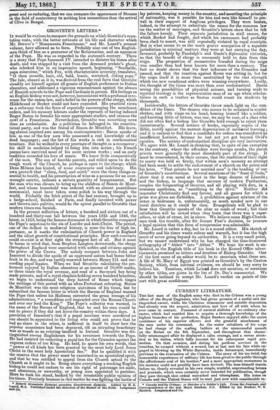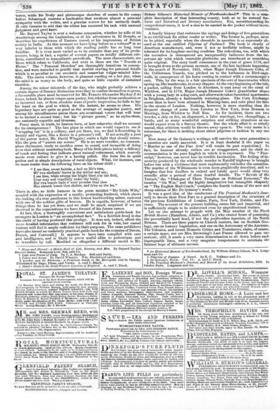CURRENT LITERATURE.
Tax last man of the English army who died in the Crimea was a young officer of the Royal Engineers, who had given promise of a useful and dis- tinguished career, while his Christian demeanour and amiable disposition had already won the respect, admiration, and love of all with whom he ever came in contact. Possessed of natural abilities of no ordinary cha- racter, which had enabled him to acquire a thorough knowledge of the highest branches of his profession, Major Ranken enjoyed alike the entire confidence of his superior officers and the grateful attachment of the men under his command. As the senior subaltern of his corps he had charge of the scaling ladders at the unsuccessful assault on the Redan on the 8th September, and throughout that shame• fully mismanaged affair he displayed a calm courage, and a serene atten- tion to his duties, which fully account for his subsequent rapid pro- motion. On that occasion, and during his perilous services in the trenches, he escaped without a wound, but at last met his fate while en- gaged in blowing up the White Barracks, inside Sebastopol, immediately previous to the evacuation of the Crimea. The story of his too brief, but honourable experiences of military life has been given to the public through the affectionate zeal of his brother,* and a more appropriate monument to his memory could not possibly have been devised. The man himself stands before us, clearly revealed in his own simple, truthful, unpretending letters and journals, which were certainly never intended for publication, though they pass through that ordeal unscathed and triumphant. His notes on Canada and the United States will be read just now with considerable in- * Canada and the Crimea; or Sketches o a Soldier's Life. From the Journals and Correspondence of the late Major Ranken, R.E. Edited by his Brother, W. R. Ranken. Longman' and Co. terest, while his lively and picturesque sketches of scenes in the camps before Sebastopol exercise a fascination that awakens almost a personal sympathy with the writer, and a genuine sorrow for his untimely death. It only remains to add that the editor has executed his task with unusual judgment and good taste. -‘ Mr. Bayard Taylor is ever a welcome companion, whether he tells of his lvanderinga among the Laplanders, or of his adventures in El Dorado, or describes his experiences of Eastern travel, or his impressions of British society in India. At this moment we have lying before us a volume* in no way inferior to those with which the reading public has so long been familiar. It is even more varied as to its contents than any of its prede- cessors, being, in fact, a reprint of several papers on totally different sub- jects, contributed to transatlantic periodicals. The most characteristic are those which relate to California, and next to these are the " Travels at Home." The " Personal Sketches" are thoroughly American in concep- tion, and were intended to gratify that morbid craving for personal details which is so peculiar to our eccentric and somewhat vulgar-minded kins- folk. The entire volume, however, is pleasant reading on a hot day, when the mind is as weary as the body, and quite as little capable of sustained exertion.
Among the minor minstrels of the day, who might probably achieve a certain degree of literary distinction were they to confine themselves to prose, a favourable place must be reserved for Mr. Francis Alexander Mackay.f At times, indeed, he almost verges upon poetry, but,whether from carelessness or an incorrect ear, or from absolute want of poetic inspiration, he fails to lay Ids hand on the goal to which, for the instant, he seems so close. His legendary lays are quite as good as the average of magazine poetry, and among his miscellaneous pieces there are occasional verses that will bear to be recited a second time ; but his " picture poems," as he styles them, are eminently soporific and tiresome.
Poesy must, in truth, be heaven-born, or how otherwise shall we account for its omnipresence ? The last place in which one would expect to see it " cropping out" is in a colliery, and yet there, too, we find it flourishing in beauty and vigour, like a flower in a prisoner's cell. If not actually a poet of the purest water, Mr. David Wingate: emits a light that closely resem- bles the gem of " purest ray serene." He is no mere versifier, no common_ place rhymester, ready to sacrifice sense to sound, and incapable of doing even that without murdering both. Many of his little pieces betray a delicacy ,of touch and feeling that indicate great natural refinement, which scarcely needs even culture to give it a lasting polish. His forte lies in quiet pathos and in simple descriptions of rural objects. What, for instance, can be more tender than the following lines on his infant child ;
" I see thee, sweet bairnie, a bud on life's tree, Wi' twa shelterin' leaves in thy wither and me; I see thee, while sweeps the bright blast o'er the field, Cour cozy and trustfully under thy held; But twa bonnie buds o' malt promise than thee Hae shrunk 'neath that shelter, and fa'en on the lea."
There is, also, no little humour in the poem entitled " My Little Wife," coupled with the expression of a manly, protecting fondness, which shows the making of a true gentleman in this honest hardworking miner, endowed with one of the noblest gifts of heaven. He is capable, however, of better things than he has yet done, and we shall be much surprised if we are deceived in the expectations we have formed of his future career.
At last, then, a thoroughly convenient and satisfactory guide-book for strangers in London is 4‘ an accomplished fact-" To a Scottish firm§ is due the credit of having produced this prodigy. It does not, indeed, afford the more detailed information that residents still seek for in vain, but casual visitors will find it amply sufficient for their purposes. The same publishers bare also issued an eminently practical guide-book for the counties of Devon, Dorset, and Cornwall 11 It appears to have been compiled with care ..and intelligence, and is likely to prove useful alike to pedestrians and to travellers by rail. Moulded on altogether a different model is Mr.
* Ilome and Abroad : a Sketch-Book of Lmfe, Scenery, and Men. By Bayard Taylor.
Second Series. Sampson Low, Son, and Co. 1. Lays and Poems of Italy. By F. A. Mackay. Bell and Daldy. I Poems and Songs. By David Wingate. Wm. Blackwood and Sons.
§ London and its Emirate : A Practical Ouidt to the Metropolis and its 'Rangy.
illustrated by Maps, Plans, and Views. A. and C. Black.
Black's Guide to the South Western Counties of England. A. and C. Black. Sidney Gibson's Historical Memoir of Northumberland.* This is a com- plete description of that interesting county, both as to its natural fea- tures and historical and literary associations. But, notwithstanding its comprehensiveness, it is of a size to be carried #e .the pocket without incon. venience.
A family history that embraces the sayings and doings of five generations is no trivial task for either reader or writer. The former is, perhaps, most to be pitied, especially when the chronicle in question is so supremely ab- surd as the one entitled Pilgrims of Fashion:I. The book is clearly of American manufacture, and, were it not so ineffably tedious, might be tolerated for its laughter-moving crudities. The reflections, too, with which the narrative is interspersed are inexpressibly ludicrous from the im- portant air with which venerable platitudes are introduced as something quite original. The story itself commences in the year of grace 1779, and is brought down to the present moment, one of the last incidents happening in the month of November, 1861, when Major Joseph Ebenezer Coke, of the Coldstream Guards, was pitched on to the kerbstone in Bird-cage- walk, in consequence of his horse coming in contact with a costermonger's cart. This, by the way, is a fair specimen of the sort of inaccuracies which spring up, like mushrooms, in every chapter. At the verybeginning of the tale, a packet, sailing from London to Aberdeen, is cast away on the coast of Wielder, and in 1779, Major Joseph Ebenezer Coke's grandfather elopes with a young lady in a dog-cart, and afterwards takes furnished apartments in Brighton, already a fashionable watering-place. The Corn Exchange seems then to have been situated in Mincing-lane, and cabs plied for hire in the streets of London_ Nothing, however, is more startling than the frequent change of scene from London to New York, from Bremen to Hastings, from Wicklow to Bull Run. As for incident, there are two wrecks, a ship on fire, an elopement, a false marriage, two changelings, a battle, and as many wonderful surprises and striking situations as one would expect even in a Surrey theatre. But the whole affair is so utterly unreal, that criticism would be thrown away upon it. The very name is a misnomer, for there is nothing about either pilgrims or fashion in any one
Page.
How many of De Quincey's writings will survive the next generation is a question not easily answered. it is at least doubtful if the paper on " Murder as one of the Fine Arts" will retain its past reputation.$ In fact, its humour already strikes one as exaggerated, and its chief re- commendation is the pure English in which it is expressed. The " Post- script," however, can never lose its terrible fascination. The feeling of in- security produced by the wholesale murder in Ratcliffbighway is brought before one with a vividness that most unpleasantly rekindles the sensation.
The murder of the Williamson is even more graphically described, and we imagine that few dwellers in retired and lonely spots would sleep very soundly after a perusal of these fearful details. The " Revolt of the Tartars," the " Dialogue of Three Templars on Political Economy," the treatise " On War," and the highly imaginative but intangible rhapsody on " The English Mail Coach," complete the fourth volume of the new and cheap edition of Mr. De Quincey's works. It was a good idea of the conductors of The Practical Mechanic's Jour- nal§ to devote their First Part to a general description of the structure of the previous Exhibitions of London, Paris, New York, Dublin, and Flo- rence. The account of the present building seems fair and impartial, and is sufficiently simple to be understood even by unprofessional readers. Let no one attempt to grapple with the May number of the North British Bevies, (Hamilton, Adams, and Co.) who cannot boast of possessing
the proverbially hard head, if not the perfervidum ingenium, of the North Britons. There are three papers on Church matters, one on Scottish Geo- logy, one on Lunacy Legislation, and one on the Astronomy of the Ancients. The Colonies, and recent Homeric Critics and Translators, claim, of course, a certain space, nor are Mrs. Browning's Last Poems allowed to pass un- noticed; still, it needs a very stern determination to sit down before such impregnable lines, and a very sanguine temperament to entertain the faintest hope of ultimate success.
• An Ilistorical Memoir of Northumberland By William Sidney Gibson, M.A. Long- man and Co.
t Pilgrims of Fashion. A Novel. By K. C. Triibner and Co. De Quincey's Works. Vol. IV. A. and C. Black. § The Practical Mechanic's Journal, and Record of the Great Exhibition, 1862. In Twelve Parts. Longman and Co.































 Previous page
Previous page